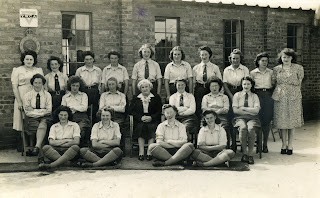The Women’s Land Army (WLA) was first established in January 1917 by Lady Denman to help increase the amount of food grown in Britain; it was wound up in 1919. In 1938 Lady Denman was approached by the Ministry of Agriculture to re-form the Land Army and so it was re-established just before the start of WWII in 1939. Lady Denman had also helped to found the W.I. and had encouraged rural women to become involved in their local community by growing and preserving food. She encouraged WIs to support the WLA and said “The prejudice against a woman attempting to do a man’s work dies hard”.
 |
| Lady Denman from womenslandarmy.co.uk |
She also said “The Land Army fights in the fields. It is in the fields of Britain that the most critical battle of the present war may well be fought and won”. At its peak in 1943 over 80,000 women worked as ‘Land Girls’, coming from a wide range of backgrounds including towns and cities as well as the countryside.
Lady Denman was instrumental in ensuring that the Land Army uniform was practical and would make the women feel proud to wear it as they worked the land for their country.
 |
| Images from womenslandarmy.co.uk |
I recently held a Zoom meeting with the daughters of two Land Army Girls, based in Bow Street just north of Aberystywth. They were very happy to share as much information as they could but both regretted not having asked more questions whilst their mothers were still alive. Their mums' names are Mary Josephine McKenna, (1925-1995) known as Josie (Married David Rowland Jones and mother to Liz Ashton) and Elizabeth Olwen Jones, (1922-1986) known as Olwen (Married Olwen Jones and mother to Meinir Jones Davies).
 |
| Josie (second left) and Olwen (fourth left) |
Liz said that her mum Josie was brought up in Liverpool in quite a large family having two sisters and a brother, but was not very 'street wise' at the age of about 18. Before the war, Josie had worked at Jacobs biscuit factory in Liverpool, she had spent some time in service and briefly a foot messenger during the raids in Liverpool. She and her family thought that she would be happier working on the land in Wales as her way of serving her country proudly.
Liz thought her mother would have been very happy with the uniform, as it was very practical and during the war none of the girls would have had much of a wardrobe. Liz also said that coming to join the Land Army was probably an eye opener for her mum, Josie. Meinir said that her mum, Olwen, was from Llanilar, close to Aberystwyth, but she chose to stay in the Bow Street hostel. She was very enthusiastic about serving as a Land Army Girl.
 |
| Women's Land Army Hostel at Bow Street, Aberystwyth |
Speaking about conditions in the hostel, Meinir and Liz thought that after a long hard day on a farm the women would be looking forward to a hot bath. However, this didn’t always happen, though a hot meal would have been provided (I think the hostel caretakers cooked – possibly featured in the last picture below, without uniform). The hostel looks cold but there would have been stories of their day to report and the camaraderie between the girls must have been helpful. Their hours of work were so long that socialising outside of the hostel was a special event.
 |
| Another view of the Bow Street Hostel |
For entertainment, Liz told us the story of her dad who lived in Bont Goch would think nothing of cycling to Bow Street Hostel meet Josie, take a bus or train into Aberystwyth to see a film and visit the Mayflower Café, and of course the reverse trip back afterwards. They also visited the Black Lion in Bow Street.
 |
| Outside the Bow St Hostel. Note the YWCA plaque, ie, the Women’s Land Army plaque |
Blog by Kath Phillips
Photographs by kind permission of Liz Ashton and Meinir Jones Davies
Sources:
nationalarchives.gov.uk/help-with-your-research/research-guides-womens-land-army






No comments:
Post a Comment